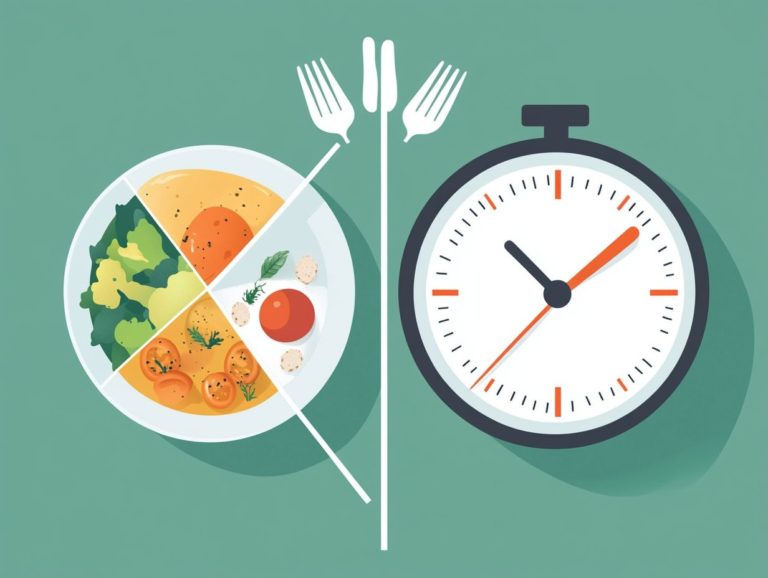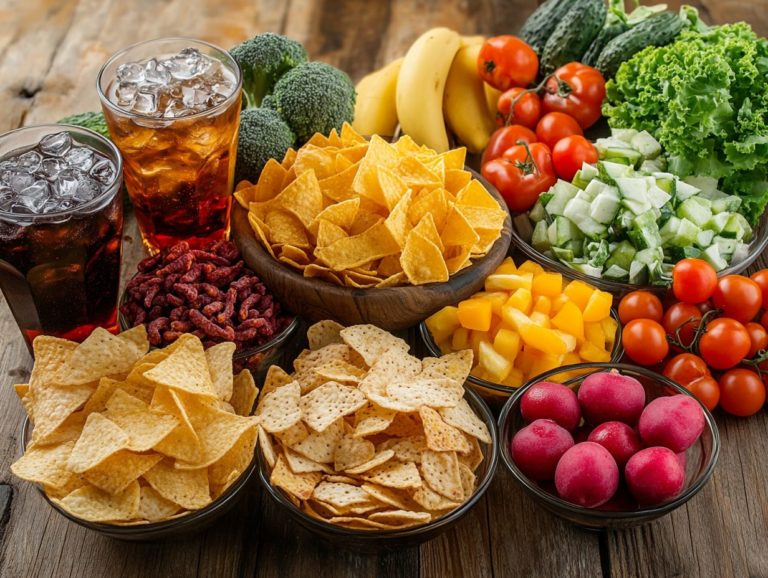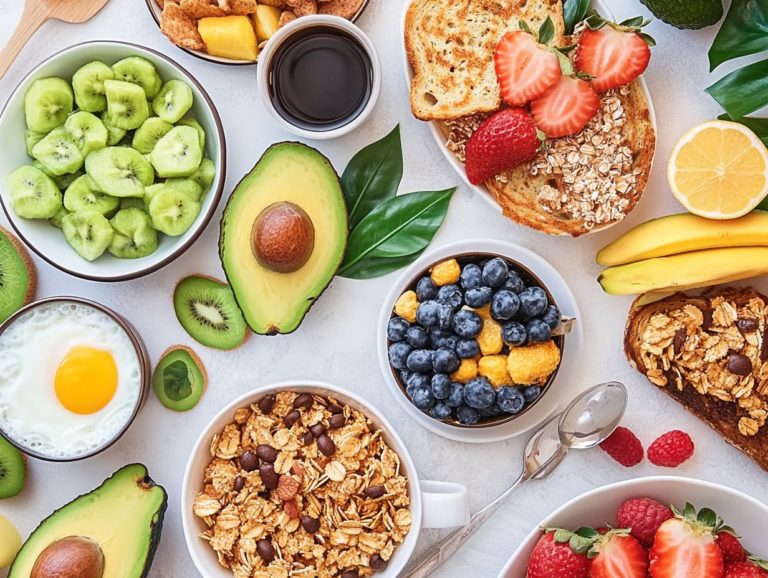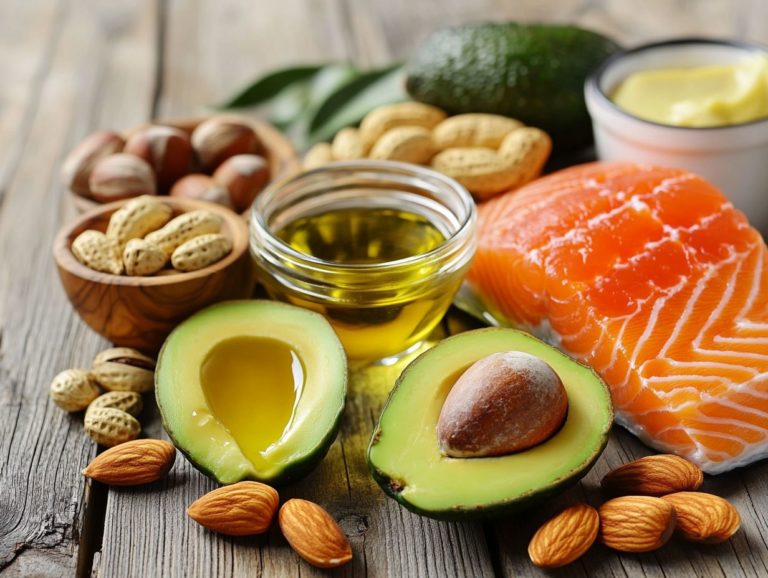5 Common Myths About Fiber
Fiber is often celebrated as a digestive superhero. Yet misconceptions can cloud your understanding and prevent you from reaping its full health benefits.
You might believe that all fiber is created equal or think that it’s easy to over-consume it. These myths can obscure the true nature of this essential nutrient.
In this article, you ll uncover five common myths about fiber, delve into its significance in your daily diet, and discover practical tips for incorporating more fiber into your meals.
Prepare to set the record straight and discover the incredible power of fiber!
Contents
Key Takeaways:
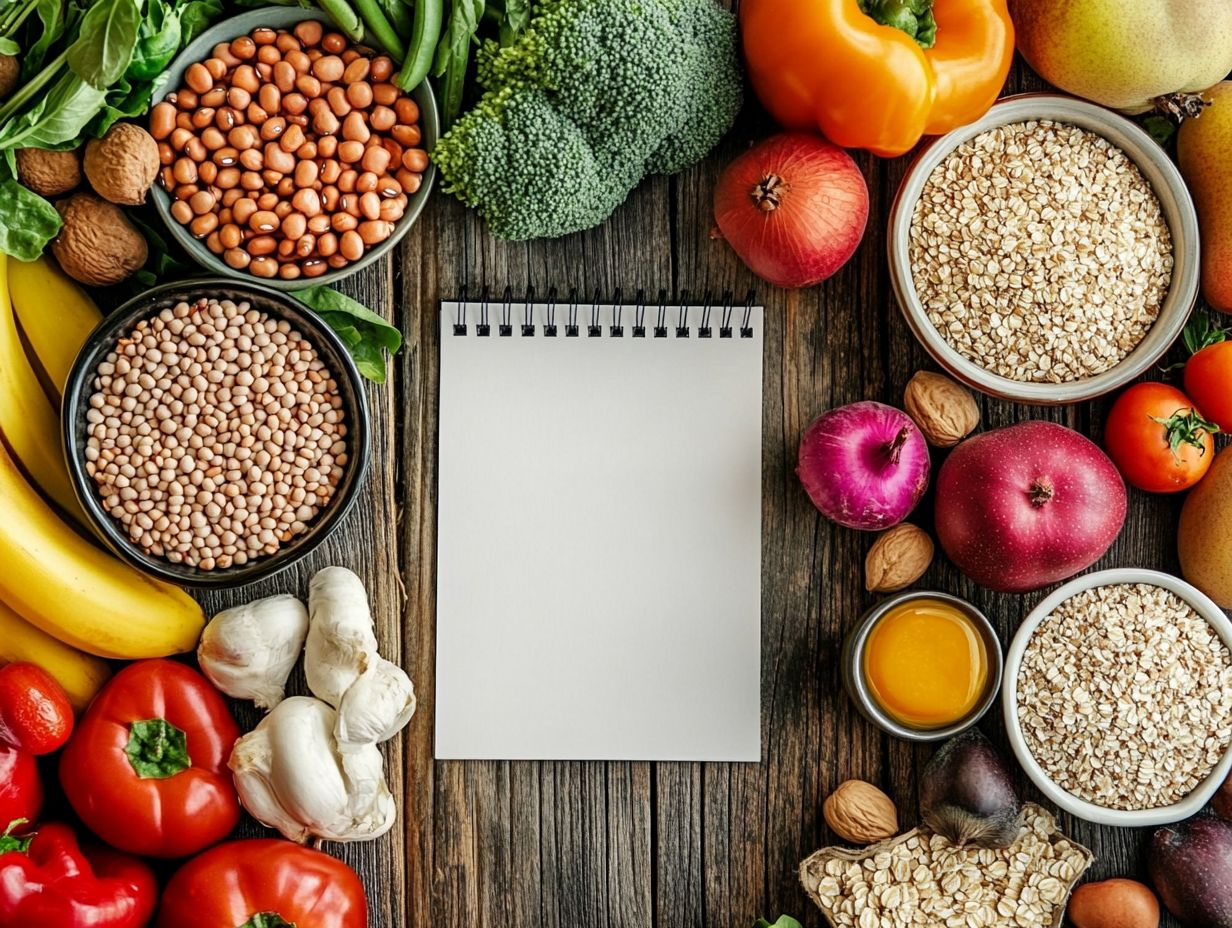
Contrary to popular belief, fiber actually helps with constipation by adding bulk and helping you go to the bathroom regularly. Not all fiber is created equal; soluble and insoluble fibers have different benefits for digestion and overall health. You can find fiber in fruits, vegetables, legumes, and nuts, not just whole grains.
1. Fiber Causes Constipation
Fiber often gets a bad rap when it comes to digestion. While it’s crucial for maintaining bowel health, a lack of fiber can ironically lead to constipation.
Understanding these two fiber types is crucial! Soluble fiber, which dissolves in water, can be found in foods like oats and beans. It transforms into a gel-like substance that softens stool and makes it easier to pass.
In contrast, insoluble fiber found in whole grains and vegetables adds bulk to your stool and encourages regular bowel movements. A study published in the American Journal of Gastroenterology reveals that individuals consuming less than 20 grams of fiber daily are at a heightened risk of constipation.
This not only highlights the necessity of adequate fiber intake but also emphasizes the distinct roles that soluble and insoluble fiber play in maintaining optimal bowel health.
2. All Fiber Is the Same
The notion that all fiber is created equal misses the essential distinctions between soluble and insoluble fiber. Both play pivotal roles in your health and in managing various digestive issues, such as constipation and diarrhea.
Soluble fiber, which dissolves in water, can be found in foods like oats, beans, apples, and flaxseeds. It forms a gel-like substance in your digestive tract, helping to lower blood cholesterol levels and stabilize blood sugar.
This makes it a key player in promoting heart health and managing diabetes. Conversely, insoluble fiber, found in whole grains, nuts, and vegetables, adds bulk to your stool and encourages regular bowel movements.
By grasping these differences, you can more effectively tailor your diet to support optimal digestive health and enhance your overall well-being.
3. Fiber Is Only Found in Whole Grains
Contrary to popular belief, fiber isn’t just the domain of whole grains. A wide variety of plant foods think vegetables, fruits, and assorted grains plays a crucial role in nourishing your diet.
This opens up a world of opportunities for you to incorporate fiber-rich foods into your daily meals, enhancing both satiety and nutritional value. For instance, legumes like lentils and chickpeas are not only bursting with protein but are also fantastic sources of soluble fiber.
Fruits such as berries and apples come packed with antioxidants, offering health benefits that go beyond just fiber. Leafy greens and cruciferous vegetables like broccoli and Brussels sprouts also stand out as excellent choices, delivering a diverse array of nutrients while supporting healthy digestion.
By diversifying your fiber sources, you ensure a more balanced intake of nutrients and promote better gut health.
4. Fiber Supplements Are Just as Effective as Natural Sources
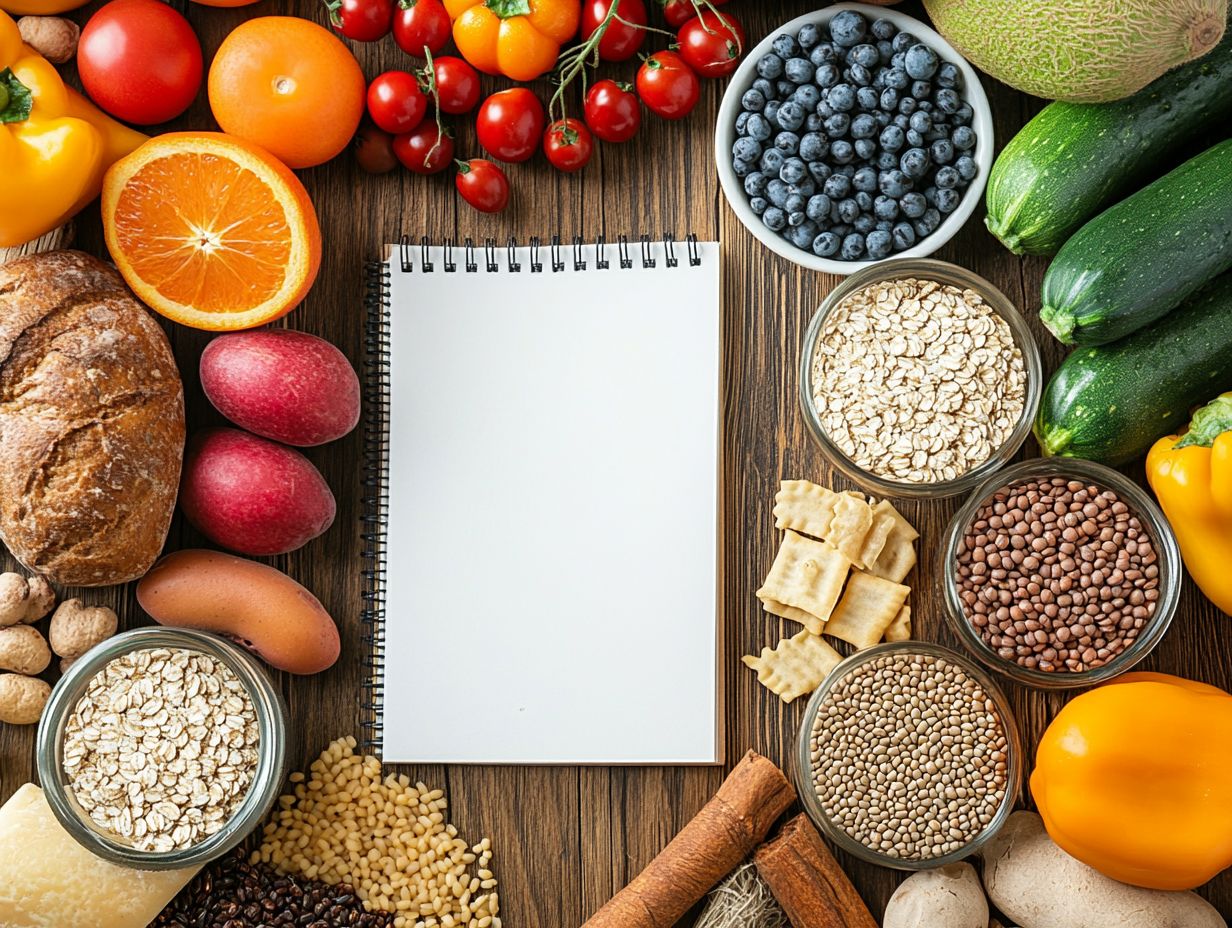
Fiber supplements may seem like a quick fix for boosting your fiber intake. However, natural fibers from whole foods are far superior for promoting health.
Research shows that diets rich in fruits, vegetables, legumes, and whole grains lead to better digestive health. These foods provide both soluble and insoluble fibers, along with necessary vitamins and minerals.
Some studies indicate that solely relying on fiber supplements can cause gastrointestinal issues like bloating and discomfort. You’re also missing out on the wellness benefits that come from fiber-rich foods.
Incorporate a variety of fiber sources into your diet for optimal health benefits.
5. You Can’t Eat Too Much Fiber
The idea that you can never consume too much fiber is misleading. While fiber is vital for digestion, too much can lead to discomfort.
For most adults, a daily intake of 25 to 30 grams is ideal. This amount helps maintain good digestive health while avoiding side effects.
Gradually increasing your fiber intake is important. Also, drink plenty of water to help your digestive system adjust.
Excess fiber can disrupt nutrient absorption and cause bloating. Finding the right balance in your fiber intake is crucial for a healthy digestive tract.
What Is Fiber and Why Is It Important?
Fiber is an essential part of a healthy diet. It consists of plant-based carbohydrates that your body cannot digest, supporting digestive health and boosting your immune system.
There are two main types of fiber: soluble and insoluble. Soluble fiber helps lower cholesterol and regulate blood sugar, while insoluble fiber adds bulk to your stool.
Research links a fiber-rich diet to a lower risk of heart disease, type 2 diabetes, and some cancers. A study suggests that eating 25-30 grams of fiber daily can significantly reduce these risks.
This highlights the importance of fiber and its multiple benefits for your health.
How Does Fiber Help with Digestion?
Fiber promotes regular bowel movements and supports gut health. It also fosters the production of valuable short-chain fatty acids like butyrate, which are crucial for bowel health.
These acids provide energy for colon cells and help control inflammation. They also strengthen the gut barrier, keeping harmful substances out of your bloodstream.
A fiber-rich diet from whole grains, legumes, fruits, and vegetables supports a diverse gut microbiota. This diversity is essential for digestive health.
By increasing the bulk and softness of your stool, fiber ensures smoother passages. This reduces the risk of constipation and related issues.
A fiber-rich diet may also lower the chances of serious digestive problems like hemorrhoids or diverticulitis.
What Are the Different Types of Fiber?
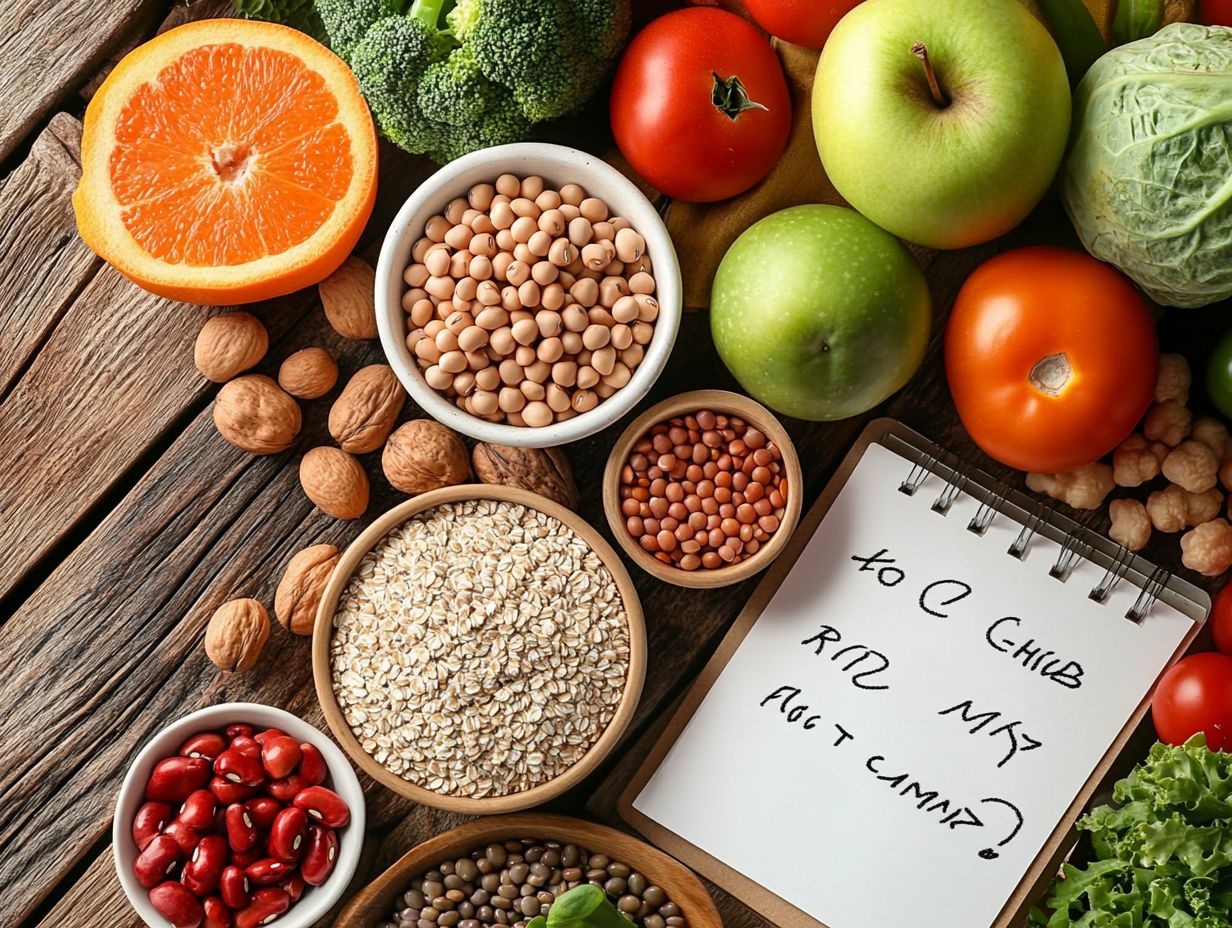
There are two primary types of fiber soluble and insoluble each offering unique properties and health benefits. These types can greatly enhance your digestive health and overall well-being.
Soluble fiber dissolves in water to form a gel-like substance. It is mainly found in foods like oats, beans, fruits, and barley. This type of fiber plays an important role in lowering cholesterol levels and stabilizing blood sugar. It is especially beneficial if you are managing heart disease or diabetes.
In contrast, insoluble fiber is found in whole grains, nuts, and vegetables. It adds bulk to your stool and helps prevent constipation. This makes it essential for maintaining gut health and preventing digestive disorders.
By understanding these distinctions, you can tailor your diet to address specific health concerns and improve your overall wellness.
What Is the Recommended Daily Intake of Fiber?
The Institute of Medicine suggests aiming for a daily fiber intake of about 25 grams for women and 38 grams for men. This recommendation highlights the importance of fiber in a healthy diet, helping to prevent various health issues and enhance your overall well-being.
Keep in mind that fiber needs can vary by age and gender. For instance, children typically require around 19 to 25 grams each day, depending on their age and sex.
To reach your fiber goals, incorporate a diverse array of foods into your meals. Whole grains, fruits, vegetables, legumes, and nuts are all excellent choices, rich in dietary fiber.
Neglecting to meet your fiber intake can lead to uncomfortable digestive issues or increase your risk of serious conditions like heart disease. Therefore, it is essential to be intentional about your fiber consumption in your daily meals.
What Are Some Common Sources of Fiber?
Common sources of fiber are abundant in the plant kingdom, including a delightful array of fruits, vegetables, grains, and legumes. Each of these foods contributes to your fiber intake and brings unique nutritional benefits.
Fruits like raspberries, pears, and apples are great options for a fiber boost. Leafy greens such as spinach and kale offer both fiber and a range of essential vitamins and minerals.
Whole grains like quinoa, oats, and barley provide soluble fiber, which helps manage cholesterol and promotes healthy digestion. Meanwhile, beans, lentils, and chickpeas shine in the legume category, offering high protein content alongside their fiber goodness. These make them ideal for plant-based meals.
To seamlessly weave these nutrient-dense foods into your daily life, consider:
- Adding a handful of berries to your morning oatmeal for a burst of flavor and fiber.
- Tossing a colorful medley of vegetables into your stir-fries for an easy, nutritious upgrade.
- Incorporating legumes into your soups and salads for a wholesome, fiber-rich boost.
How Can One Incorporate More Fiber into Their Diet?
Incorporating more fiber into your diet is essential for maintaining optimal digestive health and can help support weight loss efforts. Simple strategies, such as adding high-fiber foods like fruits, vegetables, and whole grains, can make a notable difference.
Remember to gradually increase your fiber intake to avoid any discomfort, like constipation.
Planning your meals in advance can streamline the process of selecting and preparing these nutritious foods. For example, adding legumes like lentils or chickpeas to your salads and soups not only enhances the fiber content but also provides a delightful texture that elevates your dishes.
Whole-grain bread and cereals are excellent options for breakfast or snacks, ensuring that fiber remains a staple throughout your day.
As you boost your fiber intake, don t forget to stay well-hydrated. Drinking enough water helps fiber expand and promotes smooth digestion, making it easier for your body to adapt to these healthy changes.
Frequently Asked Questions
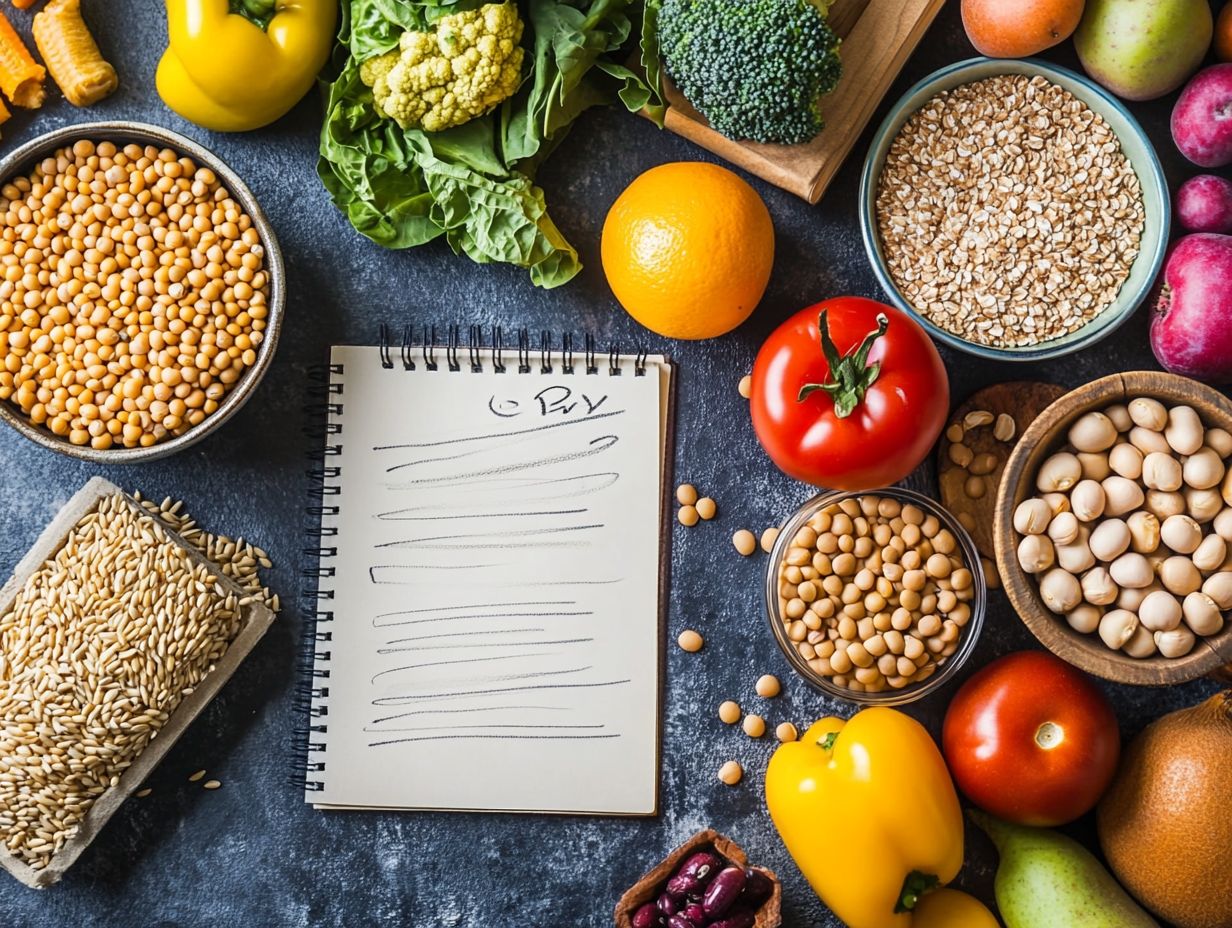
What are some common myths about fiber?
Many people think fiber causes bloating and gas. Others believe it only comes from fruits and vegetables or that it can lead to weight gain, which is just one of the common misconceptions, similar to the 5 myths surrounding calcium intake.
Does fiber cause bloating and gas?
No, fiber does not cause bloating and gas. It actually helps improve digestion and prevents constipation.
Is fiber only found in fruits and vegetables?
Fruits and vegetables are great sources of fiber. However, you can also find it in whole grains, beans, and nuts.
Can fiber lead to weight gain?
No, fiber itself does not cause weight gain. In fact, high-fiber foods are often low in calories and help you feel full and satisfied.
Is all fiber the same?
There are two types of fiber: soluble and insoluble. Soluble fiber helps lower cholesterol and control blood sugar, while insoluble fiber helps you stay regular.
How much fiber should I be consuming?
Aim for 25-30 grams of fiber each day for a healthier you! Gradually increase your fiber intake and drink plenty of water to avoid discomfort.

